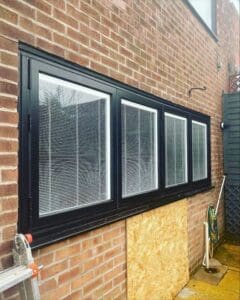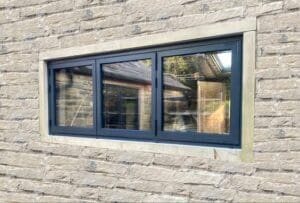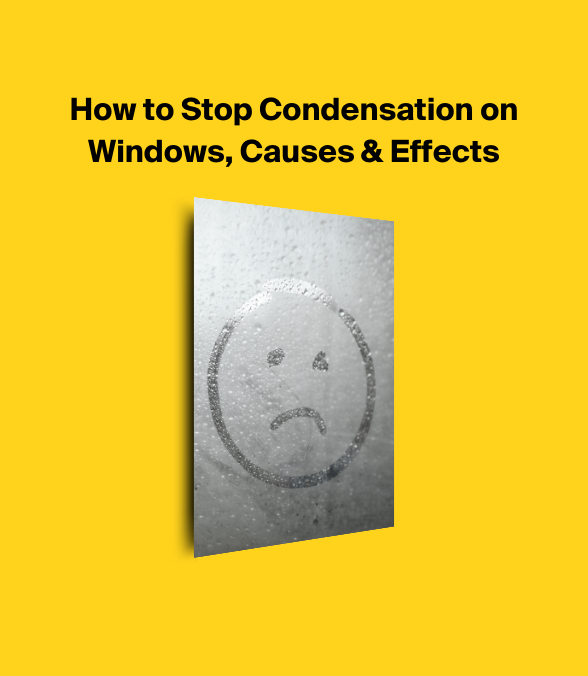Windows and Effects of Condensation
Condensation on windows can be a frustrating issue for many homeowners. Not only does it obstruct the view, but it can also lead to more serious problems if left unchecked.

In this article, we will explore the causes of condensation on windows, its effects, and, most importantly, how to prevent it.
By following these practical tips and solutions, you can bid farewell to condensation on your windows.
Value Doors offers a range of energy-efficient doors and windows with expert fitting to help keep condensation to a minimum.
See how much aluminium windows cost to replace them now with the experts.
What is condensation on windows?
Everyone's seen it, whether that be at home on your double-glazed uPVC doors and windows or in the car or on the bus when it's freezing outside, but what is it, and why does it form on windows?
Window condensation occurs when water vapour in warm, humid air comes into contact with a cold surface, such as a window pane.
The moisture in the warm air transforms into water droplets, which cling to cold surfaces such as glass in your window.
While it may seem like a minor inconvenience, condensation can have detrimental effects on your double-glazed windows and the overall indoor environment.
Causes of Condensation on double-glazed windows
Even with energy-efficient double-glazed uPVC windows, you will still get excessive moisture in the air condensing on the glass and frame of your windows.
However, there are several factors that contribute to the formation of condensation on windows. Therefore, understanding these causes is the first step towards finding effective solutions.
Temperature Difference Between Indoor and Outdoor
One of the primary causes of condensation on your double glazing is a significant air temperature difference between the inside and outside of your home.
During colder months, when the indoor heating is on, warm air can hold more moisture. When this warm, moisture-laden air comes into contact with the cold window surface, condensation forms.
Excess Moisture and High Humidity Levels
Excessive moisture and humidity within your home can exacerbate condensation issues. Activities like cooking, showering, and even breathing release moisture into the air, raising the humidity levels.
If not properly controlled, the excess moisture can accumulate on windows.
Poor Insulation
Energy efficiency is key here, and inadequate insulation around windows can contribute to condensation problems.
When warm indoor air leaks through gaps or poorly sealed windows, it can create cold spots on the glass.
These cold spots are more prone to condensation, leading to water droplets forming on the cold glass.
Effects of Condensation on windows
Condensation may seem harmless at first, but it can have several negative consequences if left unaddressed.
You can simply wipe condensation off every time you see it, but this can become tedious and therefore get left to its own devices.
Potential Damage to Windows and Frames
Persistent condensation can lead to damage to your windows and frames. The constant presence of so much condensation can cause wooden frames to rot or metal frames to corrode.
Additionally, prolonged exposure to water droplets can deteriorate the seals and glazing of the windows. This also lowers the U-Value of the window or door meaning more heat loss and more expensive bills.
Promotes Mould and Mildew Growth
Moist air and a condensation problem provide an ideal environment for mould and mildew to thrive. The moisture accumulation on double-glazing windows creates a damp surface where these fungi can grow.
Mould and mildew not only cause unsightly stains but also pose health risks, particularly for individuals with allergies or respiratory issues.
Impact on Indoor Air Quality
Moisture condensation on windows can impact the overall indoor air quality of your home. The excess moisture in the air can create a humid environment, which can make the space feel uncomfortable and stuffy.
Furthermore, prolonged exposure to high humidity levels can lead to the growth of bacteria and dust mites, further compromising air quality.

Best Way to Stop Condensation on Windows
Now that we understand the causes and effects of condensation, let's explore some effective methods to stop condensation from occurring.
Most people just wait until the sun warms the windows up and let it disappear naturally until the weather warms up.
However, there are ways to stop condensation on windows.
Managing your central heating to reduce the dew point
The dew point is the temperature at which moisture in the hot air condenses into water droplets.
Finding the ideal room temperature can be difficult, but it can be important in the steps taken to stop condensation on windows relatively easily.
By ensuring your home is kept at a comfortable constant low heat, you can lower the dew point and reduce the chance of the water vapour condensing.
Controlling Indoor Humidity Levels
Maintaining optimal humidity levels is essentially the best option when it comes to combating condensation. Aim for a humidity range of 30-50% by utilising dehumidifiers or air conditioners.
Additionally, use extractor fans while cooking, showering or using tumble dryers to remove excess moisture from the air.
This is probably one of the most effective but expensive ways to stop condensation on windows due to the running costs.
Improving Ventilation
Proper ventilation plays a significant role in preventing condensation. Ensure adequate airflow throughout your home by opening windows or using trickle vents.
This helps in circulating fresh air, reducing moisture buildup, and preventing stagnant air pockets.
If you don't want to open windows, installing air bricks or air vents in the walls is another option to improve ventilation but would require a potential mess.
Much the same as fitting an extractor fan to draw moisture away from cold surfaces.
Insulating Windows and Frames
Improving insulation around windows is essential to minimise the temperature difference between indoor and outdoor surfaces.
Seal any gaps or cracks around windows using weatherstripping or caulking. Consider upgrading to double or triple-glazed windows, as they provide better insulation against temperature variations.
Quick Fixes for Window Condensation
Even with effective double or triple glazing, if it's cold enough, it can still form condensation in small amounts.
In addition to long-term prevention methods, there are some quick fixes to help manage condensation when it occurs.
Using Absorbent Materials Near The Cold Surface
Place absorbent materials, such as silica gel packs or moisture-absorbing crystals, near windows to absorb excess moisture from the air. These materials are readily available and can help reduce condensation temporarily.
Installing Dehumidifiers Where Condensation occurs
Dehumidifiers are effective appliances that remove excess moisture from the air or rising dampness, reducing the chances of water in the air to stop condensation on windows.
Portable dehumidifiers can be used in specific areas, while whole-house dehumidifiers are ideal for larger spaces.
Applying Anti-Condensation Products
There are various anti-condensation products available on the market, such as window insulation films or sprays.
These products create a barrier on the window surface, reducing the likelihood of condensation formation. Follow the manufacturer's instructions for proper application.
Long-Term Solutions for Condensation on Windows
While quick fixes provide temporary relief, investing in long-term solutions can effectively eliminate and stop condensation issues.
Upgrading Windows with Double Glazing or Triple Glazing
Replacing single-pane windows with double-glazed or triple-glazed windows significantly improves insulation.
These windows have multiple layers of glass with insulating gas in between, reducing the temperature difference and minimising condensation.
Installing Window Film or Thermal Blinds
Window film and thermal blinds provide an additional layer of insulation, reducing heat transfer and condensation formation. They also offer privacy and UV protection while maintaining visibility.
Enhancing Overall Insulation
Consider improving the overall insulation of your home to prevent condensation.
Cavity wall insulation, loft insulation can help maintain consistent indoor temperatures, reducing the occurrence of condensation on windows.
Best Things to Do For Condensation-Free Windows
Once you have addressed condensation issues, it's essential to maintain a condensation-free environment, so here are the best ways to stop condensation on your windows all year round.
Regular Cleaning and Maintenance
Regularly clean windows and frames to prevent dust, dirt, and mould buildup. Wipe away any accumulated moisture to keep surfaces dry. Inspect and repair any damaged seals or frames promptly.
Checking for Leaks or Cracks
Regularly inspect windows for any signs of leaks or cracks that may contribute to condensation issues. Address these issues promptly by resealing or repairing damaged areas to maintain a watertight seal.
Monitoring Warm Air Humidity Levels
Continue to monitor indoor humidity levels even after implementing preventive measures.
Use a hygrometer to measure humidity and ensure it remains within the recommended range of 30-50%.
Adjust ventilation and dehumidifiers as necessary.
How to stop condensation on windows and doors - Conclusion
Condensation on windows can be a common and frustrating problem for homeowners.
However, by understanding the causes, effects, and preventive measures, you can effectively combat condensation and maintain a healthy and comfortable indoor environment.
Remember to control humidity levels, improve ventilation, and enhance insulation around windows. Consider both quick fixes and long-term solutions to address condensation issues effectively.

FAQs
Why is condensation more common in certain rooms?
Condensation is more common in rooms with excessive moisture and high humidity levels, such as kitchens and bathrooms.
These areas produce more water vapour through activities like cooking and showering.
Can condensation cause health problems?
Prolonged condensation can lead to mould and mildew growth, which can trigger allergies and respiratory issues in susceptible individuals.
If you can't stop condensation on windows, you can still get mould and mildew prevention items instead.
How can I tell if my windows are well-insulated?
If you reduce moisture in the air but you still notice condensation forming on the interior side of your windows, it may indicate poor insulation. Upgrade to double or triple-glazed windows for better insulation.
What should I do if I have condensation between the glass panes?
Condensation between the double-glazing glass panes indicates a broken seal. Contact a professional window technician to assess and repair the window panes or replace them.
You can see the cost of a new window with our guide here.
Are there any natural ways to reduce condensation?
Yes, you can try reducing humidity levels by using natural remedies like opening windows to improve air circulation, using houseplants, or using moisture-absorbing materials like charcoal or baking soda.
Remember, taking proactive steps to prevent condensation is better than the cure when it comes to maintaining the longevity of your windows and ensuring a comfortable living environment.









